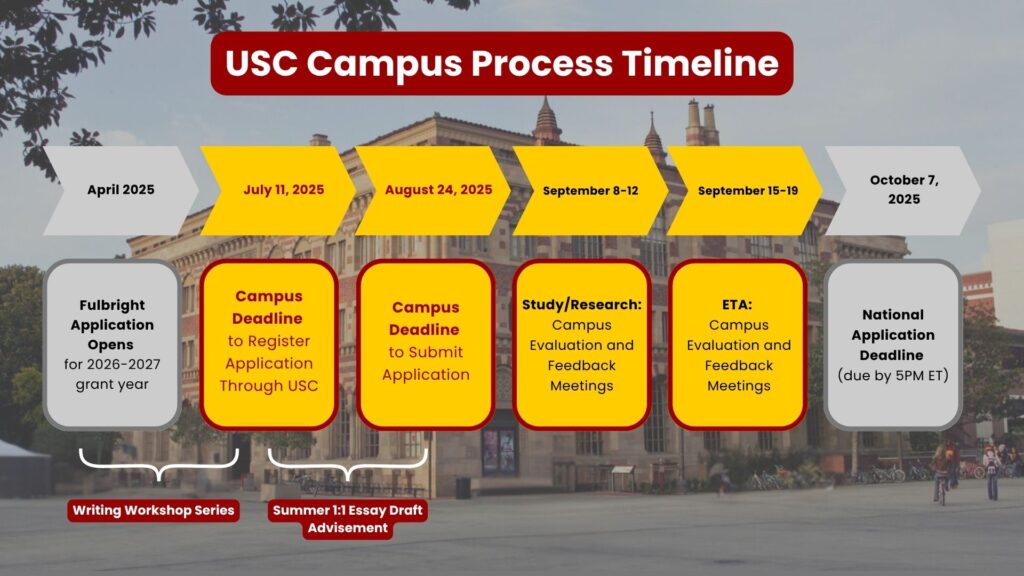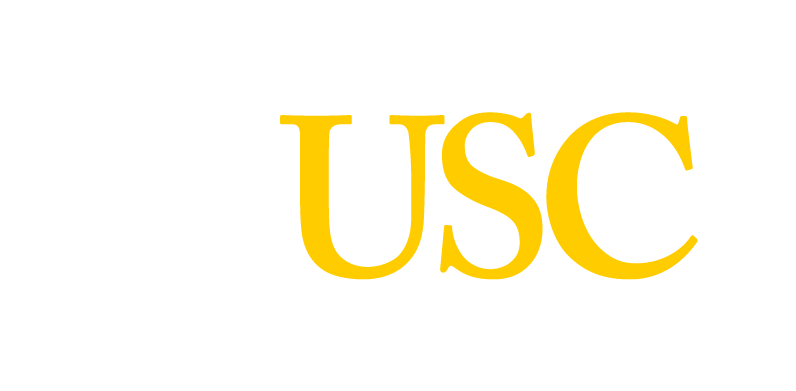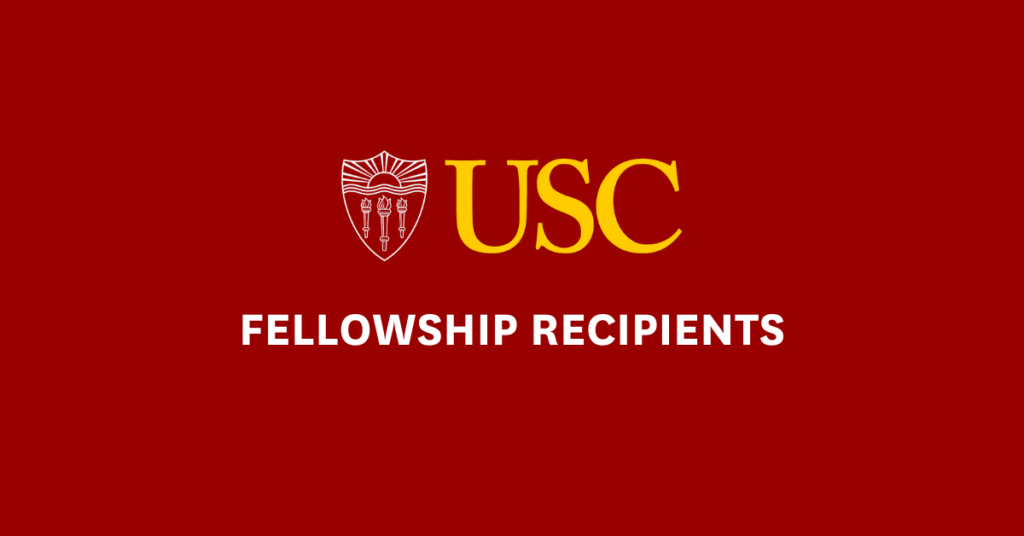About the Scholarship

The Fulbright U.S. Student Program provides grants for an academic year for individually designed study/research projects or for English Teaching Assistant programs outside of the United States. The Fulbright U.S. Student Program awards over 2,200 grants annually in all fields of study, and operates in more than 140 countries. From its inception, the Program has fostered bilateral relationships in which citizens and governments of other countries work towards mutual understanding.
Requirements
Eligibility Requirements
Basic Eligibility
Applicants must:
- Be citizens or nationals of the United States of America at the time of application. Permanent residents are not eligible. Please review the Ineligibility section regarding dual citizenship status.
- Have a conferred bachelor’s degree or equivalent before the start of the grant.
- Have sufficient proficiency in the written and spoken language of the host country sufficient to communicate with the people and to carry out the proposed study/research.
Selection Criteria
Selection is made on the basis of:
- Quality and feasibility of the proposal as described in the Statement of Grant Purpose.
- Academic or professional record.
- Personal qualifications.
- Language preparation.
- Extent to which the candidate and the project will help to advance the Fulbright aim of promoting mutual understanding among nations through engagement in the host community, among other activities.
- Requirements of the program in individual countries. In some countries, advanced-degree candidates are preferred, and in some countries, certain fields of study are not recommended.
Application Components
Application Components
For a detailed explanation of each section and additional guidance, refer to the Fulbright Application Components & Checklists
- Biographical Data
- Statement of Grant Purpose (6,000 characters for Study/Research; 3,000 characters for ETA)
- Short Answers: Fulfilling the Fulbright Mission (Abstract; Flexibility & Adaptability; Community Engagement; Impact of Fulbright Award)
- Affiliation Letter (Study/Research only)
- Foreign Language Forms (check country-specific requirements)
- Recommendations (3)
- Transcripts (official transcripts from every post-secondary institution)
- Critical Language Enhancement Award Statement (for select countries)
- Supplementary Materials (Creative & Performing Arts only)
USC Campus Process
USC juniors, seniors, graduate students and recent alumni (up to three years post-grad) are invited to apply through the USC Campus Process. Those that register through USC and apply the campus deadline and will receive feedback and evaluation with a faculty review committee.
July 11, 2025: Deadline to Register Application to Apply Through USC
The steps below are sufficient to register through USC. The online application saves as you go.
- To create an online application for the Fulbright U.S. Student Program 2025-2026 grant year, go to the Fulbright U.S. Student Program website at: us.fulbrightonline.org and hover over “Applicants”, then click “Fulbright Online Application”
- Once you create an account, complete the following within the online application:
- Preliminary Questions > Answer all questions in this section > Save and Continue
- Country and Award Selection > Institution Type > Select “University of Southern California, CA” > Save and Continue
- Contact Information > Enter Primary and Alternate Email addresses > Save
August 24, 2025: Deadline to “lock” Fulbright U.S. Student Program online application and participate in a Campus Evaluation & Feedback session
In order to be moved forward to a Campus Evaluation & Feedback session, you must “lock” your complete Fulbright application and mark it as “Ready for Campus Review” through the online portal.
A complete application must also include:
- Three (3) letters of recommendation
- Official Transcripts (You can order an official USC PDF transcript from the Registrar’s Office here: https://arr.usc.edu/records-transcripts/transcripts/order-official-pdf-transcripts/
- Affiliation letter and supplemental materials (if applicable) for your grant type
- Language evaluations do NOT need to be submitted by the campus deadline
Because we value our partnerships with faculty who volunteer their time to provide feedback and mentor applicants, we reserve the right to not allow you through to the campus committee review if your application is incomplete by the campus deadline.
Instructions For Applicants: How to “Lock” Your Fulbright Application for Campus Review
September 8-19, 2025: Campus Evaluation and Feedback Meetings
The Campus Evaluation and Feedback process is in place to enhance the overall application, not weed anyone out of the process. You will be assigned a time to meet virtually with the committee in mid-September for an evaluation and feedback meeting. After the meeting, you will have time to incorporate the suggestions received into your final Fulbright application.
The campus committee meeting serves two purposes:
- It is a chance for faculty from a variety of fields (many are Fulbrighters themselves) to review the application holistically, which mimics the Fulbright National Screening Committee model.
- The campus committee will complete an Evaluation Form of the project’s feasibility and ambassadorial potential of the applicant. The evaluation is sent to the Fulbright National Screening Committee with the application. Think of it as an additional letter of recommendation and another reason to present your best self and application materials during the campus meeting time.

Application Timelines
Campus Deadlines
- July 11, 2025: Deadline to Register Application to Apply Through USC (see “USC Campus Process” tab for registration instructions).
- August 24, 2025: Campus Deadline to “lock” Application Online (including three letters of recommendation, official transcript(s), affiliation letter and supplemental materials – as appropriate for grant type)
- September 8-12, 2025: Study/Research Campus Evaluation and Feedback Meetings
- September 15-19, 2025: ETA Campus Evaluation and Feedback Meetings
- October 5, 2025: Campus Evaluation and Feedback participants submit FINAL application
National Competition Timeline
- April 2025: Fulbright U.S. Student Program Application Opens
- October 7, 2025: National Fulbright U.S. Student Program Deadline
- January 2026: Semi-finalists Notified
- February-June 2026: Finalists Notified
Online Resources
- USC Fulbright Writing Workshop Series Videos
- USC Writing Center Appointments (please be mindful of adjusted summer hours when making an appointment)
- Successful Fulbright Statements USC Examples (password protected – please contact AHF)
- Language Evaluation USC Contact Departments
- USC Fulbright Faculty Mentors: A list of faculty willing to mentor Fulbright applicants.
- Tips & Guidelines for Statement of Grant Purpose
- How to Choose a Fulbright Grant Type/Country Brainstorm
- Fulbright U.S. Student Program Upcoming Webinars
- Fulbright U.S. Student Program Recorded Webinars
- Sample Affiliation Letter_Research
- Sample Affiliation Letter_with Translation
- Archived USC Fulbright U.S Student Program Recorded Workshops
- Black Fulbrighters: Experiences Abroad Video
Advising
Start Here! Watch our recent information session for a clear introduction to the Fulbright U.S. Student Program, key application components, and USC’s campus review process. It’s a great starting point whether you’re exploring the program or preparing for a future application cycle.
Fulbright U.S. Student Program Information Session for International Education Week (November 17, 2025)
2025 Fulbright Summer Advisement Sessions (June – July)
The purpose of Fulbright Statement Advisement is to provide feedback your application materials. Participation is not required, but strongly encouraged. A Fulbright Program Advisor in AHF or a Writing Program faculty member will meet with you for ~30 minutes during a pre-assigned meeting.
We are able to work with USC alumni up to three years after graduation. You can schedule an advising appointment as long as you graduated from a USC program May 2022 or later. Requests must be submitted by 11:45pm (PST) the day of the session deadline.
[To be considered for an advising appointment, you must first register your Fulbright U.S. Student Program application to apply through USC. See “USC Campus Process” tab for registration instructions. Then proceed to the instructions below.]
Advising Sessions
Advising Session 1 Request Form Deadline: Sunday, June 8 – for an advising appointment June 11-13
Advising Session 2 Request Form Deadline: Sunday, July 6 – for an advising appointment July 9-11
Advising Session 3 Request Form Deadline: Sunday, July 27 – for an advising appointment July 30- August 1
- All appointments will take place via Zoom.
- Preference will be given to applicants who have not yet had an AHF advisement appointment.
- Study/research applicants are strongly encouraged to secure an in-country affiliate before requesting an advisement appointment.
What you need to prepare to submit an appointment request form:
In order to confirm your appointment request, you must submit your up-to-date resume and a draft of your abstract, short answers and Statement of Grant Purpose.
⚠️ Quick formatting reminder: When submitting your short-answer responses, include each question in the header and its character count. This helps advisors quickly see which question you’re addressing and whether you’re within the character limit.
While we understand the writing you submit will be drafts, we do expect your ideas to be fleshed out in paragraph form that meet the character requirements. The abstract and short answers are part of the Fulbright application package and are chronologically the first thing reviewers see, so they should be approached thoughtfully in conjunction with the Statement of Grant Purpose. Outlines and brainstorm maps will not be accepted.
Abstract & Short Answer Prompts:
(STUDY/RESEARCH ONLY) Abstract/Summary of Proposal (1,750 character limit): Prepare an executive summary detailing the what, where, and why of your proposed project․ If you are proposing the pursuit of a graduate degree program, summarize the program and relevance to your career/education plans․
(ETA ONLY) Abstract/Summary of Proposal (1,750 character limit): Why do you wish to be a Fulbright grantee and undertake an English Teaching Assistant opportunity? Why are you applying to this specific country?
Flexibility & Adaptability (2,000 character limit): Please explain how you will adapt to working and living in a new environment in the host country. Consider the ways in which you have grown throughout your life that make you the individual you are today. How have you demonstrated these qualities in your academic, professional, or personal life? Use specific examples from your personal experiences.
Community Engagement (2,000 character limit): How will you integrate within and engage with your host community? Consider the ways in which you engage with your U.S. community (through extracurricular activities, hobbies, or volunteering), and how you can engage with these ideas and practices while on grant. In what unique ways do you plan to share your culture and values in your host community and learn from others? How do your lived experiences prepare you to represent the United States as a cultural ambassador? Provide specific examples.
Impact of Fulbright Award (1,000 character limit): An objective of the Fulbright Program is to:
“support activities and projects with broad multiplier effects. As a relatively small number of persons can participate in any of these, it is desirable that they be persons who are or who are likely to be in positions to share their experiences and knowledge with others.”
Describe your career and/or educational plans after completing a Fulbright grant. How will your Fulbright experience help you reach these future goals? How will you share your Fulbright experience with your community upon your return from the grant?
Statement of Grant Purpose:
The Statement of Grant Purpose prompt will vary depending on the type of grant and the country you’re applying to.
Before writing your Statement of Grant Purpose, first review the application components for your specific grant type to find the correct prompt and formatting guidelines.
Then, review the award description for your chosen country and grant type, as it may include additional guidance, such as translation requirements or country-specific instructions.
Writing Workshop Series Recordings (April – May)
Interested in Fulbright? Start here. Our on-demand Spring 2025 Fulbright U.S. Student Program Group Presentation & USC Writing Workshop Video recordings offer a helpful introduction to the Fulbright U.S. Student Program and are available whenever you’re ready.
These videos walk you through the basics of Fulbright and provide more information about participating in the USC Campus Process. We also highlight Trojans who recently won a Fulbright grant for research and the English Teaching Assistantship. Once you’ve chosen your grant type (Open Study/Research or English Teaching Assistantship) dive into the targeted breakout sessions. Each session includes successful essay examples and expert advice from USC Writing Program faculty to help you craft a compelling application.
 Academic Honors and Fellowships
Academic Honors and Fellowships

